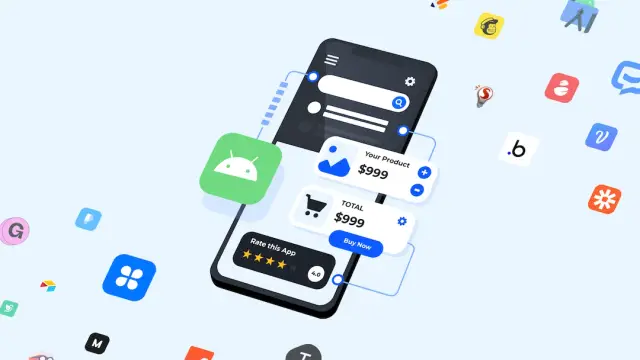Android App Builders: Beginner's Guide
Discover how Android app builders can simplify mobile development, reduce costs, and save time. Learn about no-code and low-code platforms, key features to look for, and how to choose the right one.

Android app builders are software tools that help users create Android mobile applications without writing extensive code. These tools provide an accessible and cost-effective way for individuals and businesses to design, develop, and publish custom Android apps without requiring specialized programming skills or hiring a team of developers.
App builders typically offer a user-friendly interface, drag-and-drop design tools, and a library of pre-built templates to help you get started quickly. Whether you're a small business owner, an entrepreneur, or a freelancer looking to create an app for your product or service, Android app builders can simplify the mobile development process, save time, and reduce costs.
Several options are available in the market for Android app builders, each catering to different levels of user experience, from complete beginners to those with some programming knowledge. You can find no-code and low-code app builders that provide the necessary tools and resources to bring your app ideas to life.
Benefits of Using Android App Builders
Using an Android app builder has numerous advantages over traditional mobile app development methods. Some of the key benefits include:
Faster Development Time
Android app builders significantly reduce the time spent on app development. Thanks to their user-friendly interfaces, drag-and-drop tools, and pre-designed templates, you can quickly create and test a functional app prototype with minimum effort. This streamlined process allows you to refine your app's functionality and design without worrying about coding.
Lower Development Costs
Developing a mobile app using traditional methods can be expensive, especially when outsourcing the project to a team of developers or an agency. Android app builders offer more affordable alternatives by eliminating the need for hiring multiple professionals. This cost-effective approach enables businesses to create custom mobile applications with a smaller investment, allowing for better control over their budget.
Simplified App Updates
Maintaining and updating an app can be a challenge with traditional development methods. Android app builders make it easier to introduce new features, fix bugs, or change the app's appearance by using their intuitive interfaces. With a few clicks, you can keep your app up-to-date and engaging for your users without hiring a developer for each update.
Ease of Use and Access
Android app builders are designed to be easy to use, making app development accessible to a broader range of users, including those with little or no programming experience. These platforms enable creative individuals, entrepreneurs, and small business owners to build and deploy their mobile apps without requiring extensive technical skills.

No-code vs. Low-code Android App Builders
When selecting an Android app builder, you will often come across two categories: no-code and low-code app builders. Though they share some similarities in their goal to simplify the app development process, there are crucial differences between them.
No-code Android App Builders
No-code app builders aim to remove the need for programming expertise entirely. These platforms provide a visual drag-and-drop interface and a library of pre-built components to help you design and develop your app, even without coding experience. No-code app builders are ideal for users who want to create a functional mobile app quickly and easily without learning programming languages like Java or Kotlin.
Low-code Android App Builders
Low-code app builders provide more customization options compared to their no-code counterparts. While they also simplify the app development process, low-code solutions often require some level of coding knowledge to unlock their full potential. These platforms offer the best of both worlds, enabling users with minimal programming experience to create more sophisticated mobile applications by leveraging their coding knowledge to a lesser extent.
The choice between no-code and low-code Android app builders depends on your individual needs, skills, and the complexity of your app concept. A no-code app builder could be an excellent choice if you have no programming experience and need a simple app. But, if you have some coding skills and want more control over your app's features and design, a low-code app builder might be a better fit.
Choosing the Right Android App Builder: Key Features and Considerations
Selecting the right Android app builder is a critical step in ensuring the success of your mobile app project. When comparing your options, keep these key features and considerations in mind:
- User-friendly interface: A well-designed interface is essential for creating apps efficiently. Look for Android app builders offering a drag-and-drop editor, simplifying the design process, and intuitive navigation that minimizes the learning curve.
- Customization options: Ensure that the platform provides a variety of templates and components to customize your app's appearance and functionality. The more customization options available, the more you can tailor your app to suit your requirements.
- Pre-built features: App builders should offer a wide range of built-in features, such as user authentication, push notifications, and analytics. These features save you time on development and can be instrumental in providing a rich user experience.
- Scalability: Choose an app builder that allows for easy scalability to accommodate future growth and changes in your business. The platform should allow you to quickly scale your app as needed, such as adding new features, users, or integrations.
- Third-party integration: Your app builder should support seamless integration with popular third-party services and tools. This allows you to enhance your app's capabilities, streamline your workflows, and improve productivity.
- Customer support: Excellent support is crucial, especially for beginners. Check the availability and quality of customer service, including live chat, email, and knowledgebase resources. This ensures you can quickly get assistance when needed.
- Pricing: Compare pricing options for various app builders and ensure the chosen platform suits your budget. Remember that some platforms offer free plans with limited features, while others provide more extensive features with subscription-based pricing.
Beyond these fundamental features, you also need to consider additional factors like app testing, platform compatibility, and app store submission support. Choosing the right Android app builder depends on your needs, budget, and expertise level.
Getting Started with Android App Builders
Once you've selected the right Android app builder for your needs, getting started with the platform typically involves the following steps:
- Sign up: Register for an account on the app builder's platform. Some platforms offer a free trial or plan with limited features, which can be an excellent opportunity to explore the available tools and resources.
- Create a new project: Start a new app project within the platform after signing up. This involves selecting the desired app type (Android, in this case) and providing basic information about your app, such as its name and description.
- Choose a template or start from scratch: Some app builders provide a wide range of customizable templates that can be a great starting point for your app's design. Alternatively, you can choose to start with a blank canvas and create your app's design from scratch.
- Design your app: Using the platform's drag-and-drop editor and built-in features, design your app's user interface, incorporating the desired color schemes, fonts, and images. Be mindful of user experience principles to ensure your app is visually appealing and easy to navigate.
- Add functionality: Implement app functionality using the app builder's pre-built features, such as user authentication, push notifications, and analytics. Configure these features according to your specific requirements and business goals.
- Integrate third-party services: Connect your app to relevant third-party services and tools, such as payment gateways, databases, and analytics platforms, to enhance its capabilities and streamline workflows.
- Test your app: Thoroughly test your app on various Android devices and screen sizes, checking functionality, usability, and performance. Identify and resolve any issues before proceeding to the app store submission process.
- Publish your app: Once it is tested and polished, submit your app to the Google Play Store for approval and distribution.
AppMaster: An Android App Builder for Every Need
AppMaster is a powerful no-code platform that enables you to design and deploy Android, web, and backend applications, simplifying the app development process even for users without programming expertise. With a user-friendly interface, customizable templates, and powerful pre-built features, it is suited for businesses of all sizes and app development needs.
Some of the major highlights of AppMaster include:
- Intuitive drag-and-drop editor: Easily design your app's user interface with the platform's drag-and-drop editor, optimizing it for a smooth user experience.
- Customizable templates: Kickstart your app development with AppMaster's wide range of professionally designed templates or build your app's design from the ground up.
- Business process designer: Leverage the platform's visual Business Process designer to create server backend logic and mobile business logic for your app, streamlining workflows and improving user interactions.
- Scalable infrastructure: AppMaster supports high scalability, making it an ideal platform for enterprise and high-load use cases. The platform generates applications from scratch, ensuring there is no technical debt.
- External integrations: Incorporate various third-party services into your app through AppMaster's extensive support for external integrations.
- Flexible pricing plans: Catering to various app development needs and budgets, AppMaster offers a range of pricing plans, including free and subscription-based options.
By harnessing the capabilities of AppMaster, you can create comprehensive, scalable mobile applications tailored to your specific requirements while saving time and reducing costs on development. To learn more and explore the platform, create a free account.
FAQ
An Android app builder is a software tool that allows you to create, design, and deploy Android applications without the need for extensive coding knowledge. These tools often include a drag-and-drop interface, pre-designed templates, and built-in features that simplify app development.
Using an Android app builder provides several benefits such as faster development time, reduced development costs, simplified app updates, and easier app management. They enable businesses to create custom mobile apps without needing expertise in Android programming.
No-code Android app builders are designed for users with no programming experience, offering drag-and-drop interfaces and visual editors to create apps. Low-code app builders allow more customization, often requiring some level of coding knowledge, but still simplify the overall development process.
To choose the right Android app builder, consider factors like your budget, time constraints, desired app features, and user experience. Look for key features like a user-friendly interface, customization options, scalability, and reliable customer support.
To get started with an Android app builder, sign up for an account or a free trial with a preferred app builder platform. Use their tools and resources to create your app's design and features, test your app thoroughly on various devices, and then publish it to the Google Play Store.
Yes, AppMaster is a powerful no-code platform that allows you to design and deploy Android applications, as well as backend and web apps. With its user-friendly interface, customizable templates, and robust features, it is suited for businesses of all sizes and app development needs.






